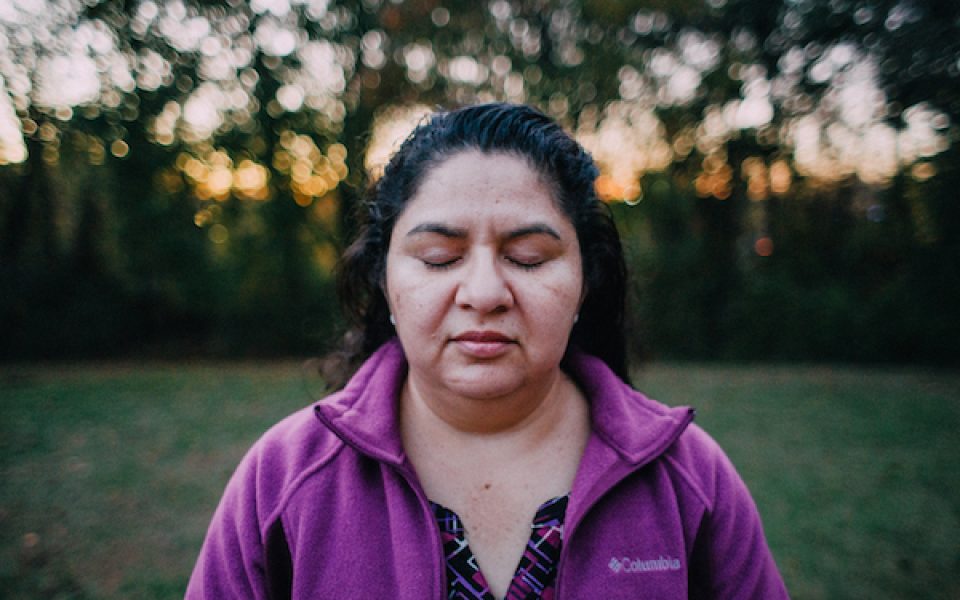Dir. Pilar Timpane and Christine Delp, USA, 2018, 26 min.
Juana Luz Tobar Ortega crochets with olive-green yarn, her hands moving deftly as she manipulates the string between her fingers.
“This is what I do to make the time go faster,” she says in the translated subtitles. “It takes away the stress.”
The short documentary “Santuario” follows Ortega’s day-to-day life at St. Barnabas Episcopal Church in Greensboro, where she has taken sanctuary to avoid deportation since 2017. At the start of the film, Ortega — who, fleeing violence, immigrated to the US from Guatemala in 1991 — had lived for just two weeks in a small room at the church, fitted with a bed, a side table, a dresser and hand-drawn pictures by her grandkids that decorate the otherwise bare, cinderblock walls. By the end of the film, she’s been there for a year.
Ortega was one of the first undocumented immigrants in North Carolina to take sanctuary in recent history, the film explains, and did so after living in the country for more than 20 years. Now, she is confined to the church grounds and wears an ankle monitor that ICE uses to track her movements.
“There are times when people of faith have to make a choice between serving the people that we believe God has called us to serve and serving the government,” says the Rev. Randall Keeney, the pastor at St. Barnabas. “And some laws are simply unjust.”
Through the 25-minute documentary, viewers are given an intimate look into Ortega’s attempts to maintain a certain level of normalcy in her life. Her kids and her grandchildren visit her when possible, and she attends services at the church where members of the congregation greet her warmly and sing and pray with her. Still, both Ortega, as well as her family members, fail to hold back tears, as they individually struggle to deal with the uncertainty of Ortega’s future.
“What we want is for people to know that this is happening,” says Lesvi, one of Ortega’s daughters. “You can’t turn away because we’re not the only ones.”
Interspersed between scenes of Ortega’s daily life are examples of other undocumented immigrants who also took sanctuary to avoid deportation. Minerva Cisneros Garcia, a Mexican woman who had taken sanctuary at Greensboro’s Congregational United Church of Christ a month after Ortega, visits Ortega at St. Barnabas after learning that an immigration judge had vacated her deportation order. The two women embrace as tears run down their faces.
“I hope that you can leave here soon,” Garcia says to Ortega as they sit at a table together.
“Yes, to go help others going through the same thing as us,” Ortega responds. The two women clasp hands and the camera zooms in.
At the end of the film, Ortega cries as she watches Garcia leave after she visits her at St. Barnabas, her feelings of happiness for Garcia mixed with a yearning for her own freedom.
“I don’t think we can afford to be silent anymore,” Keeney says. “The question isn’t if something is wrong; we know it is. The question is what will we do.”
By capturing the quiet, mundane moments that make up a life, “Santuario,” shows viewers how much those moments can mean when they are taken away. The film also demonstrates the power that religion and community can play in such a divided political landscape. And it highlights the uncertainty and real threats that those in our community face every day due to anti-immigrant policies.
“As of the completion of this film, she remains in sanctuary,” ends the film.
Filmmakers confirmed that as of the publication of this review, Ortega is still at St. Barnabas.
Santuario screens on Sunday at 2 p.m. and April 12 at 3:30 p.m. at Hanesbrands Theatre in Winston-Salem.
— SM
You may also enjoy these Riverrun 2019 reviews:
The River and the Wall: This visually stunning documentary tracks a group of friends who travel from El Paso to the Gulf of Mexico on a 1,200-mile journey to document the border and investigate the looming impacts of a wall on the natural environment.
Bei Bei: This documentary delves into the abortion debate by focusing on Bei Bei Shuai, a Chinese immigrant woman living in Indiana, who is facing two felony counts after her baby died when she committed suicide.
Find the full list of reviews here.
Join the First Amendment Society, a membership that goes directly to funding TCB‘s newsroom.
We believe that reporting can save the world.
The TCB First Amendment Society recognizes the vital role of a free, unfettered press with a bundling of local experiences designed to build community, and unique engagements with our newsroom that will help you understand, and shape, local journalism’s critical role in uplifting the people in our cities.
All revenue goes directly into the newsroom as reporters’ salaries and freelance commissions.


Leave a Reply